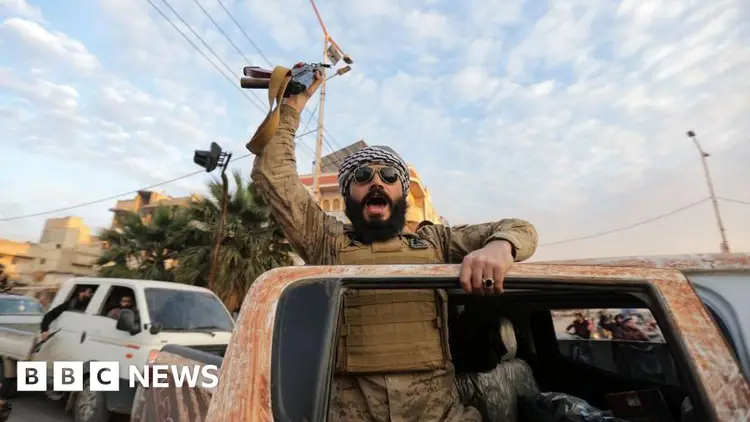Thousands flee Syrian city Homs as rebels advance further

On Thursday, Syrian opposition fighters announced their triumph in Hama, marking the military's retreat from a second significant city in the country.
Tens of thousands of individuals are escaping Homs, Syria's third-largest city, as there are reports indicating that rebel forces are advancing. This comes just over a week after the rebels began their rapid offensive.
On Thursday, the rebels captured Hama in the north, marking another significant setback for President Bashar al-Assad, who lost control of Aleppo just the week before.
The head of the Islamist militant organization Hayat Tahrir al-Sham (HTS), Abu Mohammed al-Jawlani, informed the people of Homs that "the moment has arrived for you."
Last week, opposition troops launched their most significant assault on the Syrian government in several years.
They have been moving southward, and Homs is anticipated to be the next destination on their way to the capital, Damascus.
Their offensive marks the fastest progress on the battlefield by either side in the 13 years since the start of the Syrian civil war, highlighting the vulnerabilities within the nation's military forces.
Frightened members of President Assad's Alawite minority are fleeing Homs, as videos reveal heavy traffic on the roads filled with vehicles.
The rebels' coordinated operations center reports that their fighters have moved through two towns, Rastan and Talbisseh, and are now just 5 kilometers (3.1 miles) away from Homs.
The BBC has been unable to confirm these movements, however, the Syrian Observatory for Human Rights (SOHR), a war monitoring group based in the UK, is also providing reports about them.
Previously, the Syrian Observatory for Human Rights reported that Russian fighter jets targeted a bridge in Rastan in an effort to hinder the progress of rebel forces.
With the Syrian military having lost its grip on Hama after several days of combat, it's uncertain if they can effectively protect Homs.
Homs is a crucial city that connects Damascus with the Alawite region located along the Mediterranean coast.
The Alawites are a smaller group within Shia Islam, and they are the ethnic and religious background of the Assad family.
They have consistently been a significant source of support for Assad's regime and play a crucial role in maintaining the president's authority.
Assad has promised to completely defeat the rebels and has blamed Western countries for attempting to change the layout of the region.
However, experts indicate that his troops are disheartened, facing issues like inadequate salaries and corruption within their ranks. Recently, he declared a 50% salary increase, as reported by the state news agency SANA.
Russia and Iran, the regime's key allies, have reaffirmed their ongoing backing for Assad.
However, they haven't offered the level of military support that has been sustaining his leadership until now, and Moscow is currently advising Russian citizens to exit the country.
The Kremlin is focused on its conflict in Ukraine, while Iran has been significantly affected by Israel's intense actions against its strongest allied group, Hezbollah in Lebanon.
Hezbollah, whose members played a crucial role in maintaining control over areas held by the regime in Syria, are now mostly missing from the fight. However, some reports from Lebanese and Israeli media indicate that a few fighters have crossed the border to support the defense of Homs.
Russian and Iranian representatives are set to hold discussions with their Turkish counterparts over the weekend to address the recent escalation in the civil war in Syria.
Turkey supports certain rebel factions, and its president, Recep Tayyip Erdogan, has been urging Mr. Assad for several months to find a political resolution with the opposition.
He has expressed support for the rebels' recent progress and stated that the military action wouldn’t have taken place if Assad had listened to his requests.
Experts suggest that it likely wouldn't have taken place without the awareness and consent of Ankara.
The head of HTS, Abu Mohammed al-Jawlani, has been speaking publicly to improve his reputation and to put both the Syrian people and international leaders at ease.
He has highlighted that he distanced himself from the Islamic State and Al Qaeda several years ago. He portrays himself as a nationalist who is against carrying out attacks outside of Syria and pledges to safeguard minority groups within the country.
Since the civil war began in 2011, over 500,000 people have lost their lives after the Assad government responded with brutal force to peaceful protests advocating for democracy.
According to the Syrian Observatory for Human Rights, over 820 individuals have lost their lives throughout the nation since the start of this offensive nine days ago, with 111 of those being non-combatants.
Previously, HTS fighters and their supporters seized control of Hama and freed prisoners from the central jail during intense clashes, while the military announced that it had moved its troops away from the city.
Hama has a population of one million and is located 110 kilometers (70 miles) south of Aleppo, a city that rebels took control of last week.
The instant when the statue of the former Syrian president was brought down in Hama.
At the same time, the United Nations has stated that the ongoing conflict is making an already terrible situation for civilians in the northern part of the country even worse.
Around 280,000 individuals have been forced to leave their homes, with the majority being women and children. Additionally, some civilians are stuck in frontline regions, unable to find their way to safer places.
In Aleppo, a city with a population of two million, various public services and essential facilities—such as hospitals, bakeries, power plants, as well as water, internet, and telecommunications—are either limited or not operating at all due to a lack of resources and staff.
UN Secretary-General Antonio Guterres called on everyone who has the power to help to contribute to ending the civil war.



































































